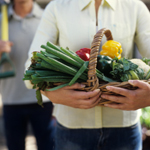Sustainable Food

The types of foods we buy, where they are produced, and the techniques used to grow them can affect our personal health and the health of our environment. Purchasing food from community supported farms, farmer's markets, and produce stands can help support your local economy, and also saves energy. Most of the produce available in grocery stores is transported from locations hundreds or thousands of miles away. During its trip from the farm to our store, fresh produce must be refrigerated. The fuel used to transport and refrigerate food requires a lot of energy to be spent. Produce also loses nutrient content during its long trek to our table. Nothing compares to the freshness and taste of locally grown produce!
Organic farming is rapidly gaining popularity, and it is practiced in approximately 120 countries throughout the world. Certified organic food is produced by farmers who emphasize the use of renewable resources and the conservation of soil and water to enhance environmental quality for future generations. Organic meat, poultry, eggs, and dairy products come from animals that are given no antibiotics or growth hormones. Organic food is produced without using artificial colors or preservatives, synthetic pesticides or fertilizers, sewage sludge, genetically modified organisms, or ionizing radiation.
Additional Resources
- UF/IFAS Center for Organic Agriculture
- Organic Certification | Florida Dept of Agriculture and Consumer Services
- Florida Certified Organic Growers and Consumers
- National Organic Program | AMS USDA
- National Sustainable Agriculture Information Services (ATTRA)
- Organic Publications on ATTRA
- Organic Farming Research Foundation
- Sustainable Agriculture Research and Education
- Local Harvest - Find locally-grown food near you



